Kreidenweis group identifies cleanest air on Earth in first-of-its-kind study
Colorado State University Distinguished Professor Sonia Kreidenweis and her research group identified an atmospheric region unchanged by human-related activities in the first study to measure bioaerosol composition of the Southern Ocean south of 40 degrees south latitude. Kreidenweis’ group, based in the Department of Atmospheric Science, found the boundary layer air that feeds the lower clouds over the Southern Ocean to be pristine – free from particles, called aerosols, produced by anthropogenic activities or transported from distant lands. Their findings are published in Proceedings of the National Academy of Sciences.
Weather and climate are complex processes connecting each part of the world to every other region, and with climate changing rapidly as a result of human activity, it’s difficult to find any area or process on Earth untouched by people. Kreidenweis and her team suspected the air directly over the remote Southern Ocean that encircles Antarctica would be least affected by humans and dust from continents. They set out to discover what was in the air and where it came from.
“We were able to use the bacteria in the air over the Southern Ocean as a diagnostic tool to infer key properties of the lower atmosphere,” said research scientist Thomas Hill, coauthor on the study. “For example, that the aerosols controlling the properties of SO clouds are strongly linked to ocean biological processes, and that Antarctica appears to be isolated from southward dispersal of microorganisms and nutrient deposition from southern continents. Overall, it suggests that the SO is one of very few places on Earth that has been minimally affected by anthropogenic activities.”
Read the full Source article, “CSU atmospheric scientists identify cleanest air on Earth in first-of-its-kind study.”
Photo at top: Aerosol filter samplers probe the air over the Southern Ocean on the Australian Marine National Facility’s R/V Investigator. Photo by Kathryn Moore.



